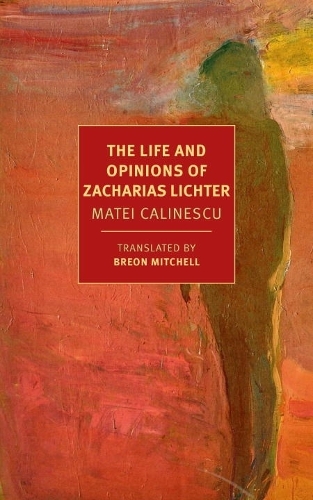
The Life And Opinions Of Zacharias Lichter
(Paperback, Main)
Publishing Details
The Life And Opinions Of Zacharias Lichter
By (Author) Breon Mitchell
By (author) Matei Calinescu
New York Review Books
NYRB Classics
15th March 2018
12th April 2018
Main
United States
Classifications
General
Fiction
859.334
Physical Properties
Paperback
184
Width 126mm, Height 203mm, Spine 11mm
180g
Description
A new translation of the only novel by lauded Romanian literary critic Matei Calinescu It was the late 50s and the Communist regime of Romania was at its most punitively unforgiving when Matei Calinescu, who had just graduated form the University of Bucharest, conceived of Zacharias Lichter. "I must create a myth," he jotted in his diary, "and become its hero--that's my idea! ... A Judeo-German metaphysician, descended as if from the XVIIIth century (or that's how he likes to think of himself) who talks about responsibility, about a dialogue of purity with God, about perplexity facing the void." In the following years, Zacharias Lichter, madman, fool, philsopher, and the weirdest of rebels without a cause would come to life in Calinescu's fictional account of his life and opinions, a book written for his private amusement since he assumed the censors would never permit its publication. He was wrong about that, however. The censors were completely oblivious to the subversive humor and intent of his book, which became a cult classic. Miecre Cartarescu wrote in 2011 "In his novel The Life and Opinions of Zacharias Lichter, Matei Calinescu imagined, in a visionary manner a social system whose inhabitants were either thieves or beggars. Thieves would steal from beggars and beggars would seek alms from thieves. How did you know, Matei, that we would get to become that very society in such a short time" The Life and Opinions of Zacharias Lichter paints an unforgettable picture of a free man in a false world.
Reviews
"A literary jewel of eccentricity seen as an ethical provocation, which created an unforgettable shock at a time when the mental stereotype imposed by the dictatorship was dimly trying to find the first slits for a breakthrough....The writer summons, in an artistic undertaking that is ever vigorous and vibrant, the fundamental questions of existence, the ephemeral and the transcendent stimulating each other in a dynamic exchange of energy, with original and seductive accords of lasting resonance." Norman Manea
A Baal Shem Tov imagined by Sterne. Emil Cioran
"A picaresque life of an imagined philosopher who speaks in torrents and trades in absurdity...[Lichter] lives up to what an acolyte of his calls 'a pedagogy of beguilement'." Kirkus Reviews
Author Bio
Matei Calinescu (1934 - 2009) was a literary critic and professor of comparative literature at Indiana University. Born and educated in Bucharest, he was offered a Fulbright grant and defected to the United States in 1973. He wrote several works of nonfiction, including Five Faces of Modernity and Rereading. Breon Mitchell is a scholar and translator of several works by various authors, including The Tin Drum by G nter Grass, The Trial by Franz Kafka, and The Silent Angel by Heinrich B ll. He is Professor Emeritus of Germanic Studies and Comparative Literature at Indiana University. Norman Manea has written numerous books of fiction and nonfiction, including the acclaimed memoir The Hooligan's Return and the novel The Lair. Since leaving Romania in 1986 due to intolerance by Communist authorities, Manea's writing has been translated into more than twenty languages and he has been awarded several prestigious literary prizes, including the MacArthur Fellowship, the Medicis tranger, the Nely Sachs Prize, and the Guadalajara International Book Fair's (FIL) 2016 Literature in Romance Languages Award. He is Professor Emeritus and Distinguished Writer in Residence at Bard College.
